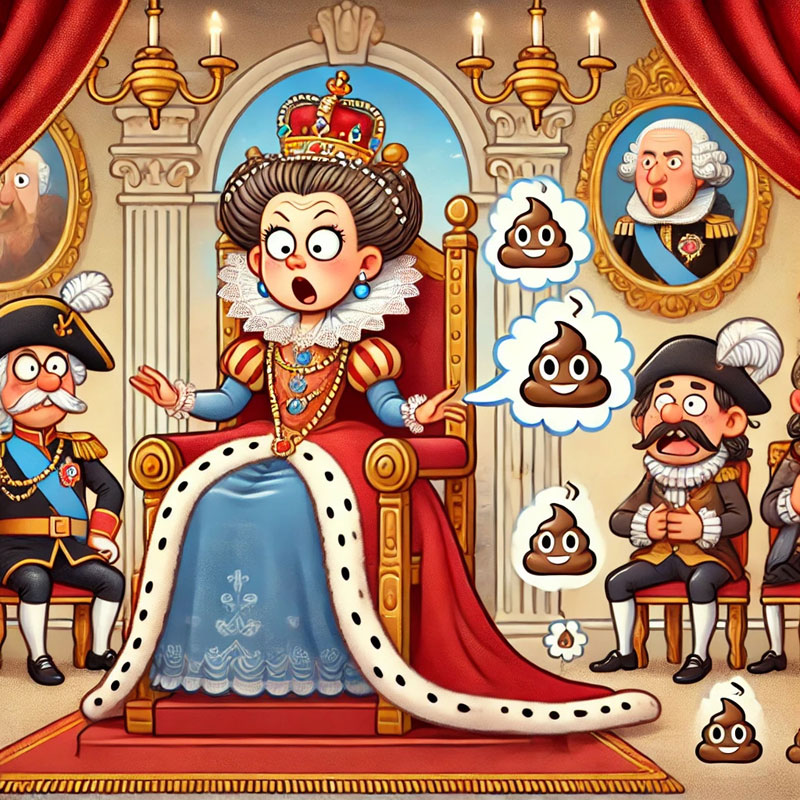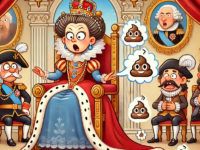
Farting is a universal human experience—one that transcends culture, status, and time. Whether it’s a quiet room or a packed auditorium, there’s something about flatulence that always gets a reaction. Yet, beyond the jokes and embarrassment, there have been several instances where farts have played a surprisingly important role in history. As comical as it sounds, these gas-related incidents have shaped events, decisions, and the course of history in unexpected ways. So, let’s dive into the wild and windy world of farts that changed history.
The Fart That Sparked an Ancient Egyptian Revolt (12th Century BCE)
In ancient Egypt, there is a tale of a fart that supposedly sparked one of the earliest recorded revolts. A pharaoh’s courtier, during a highly solemn ceremony, accidentally let out a fart that echoed throughout the temple. The pharaoh, infuriated by this insult to the gods, ordered the courtier to be punished severely. This event fueled public discontent, and what followed was a rebellion against the ruling class. While some historians question the accuracy of this story, it highlights how a simple bodily function can become the catalyst for larger social movements.
Martin Luther’s Flatulent Inspiration (16th Century)
The Protestant Reformation, one of the most significant movements in European history, may have been propelled by farts—well, sort of. Martin Luther, the German theologian who launched the Reformation, was known for his ongoing battle with digestive issues, including chronic flatulence. According to some of his writings, Luther claimed that Satan attacked him through his bowels, and he frequently referenced farting as part of his spiritual struggle. He once wrote, “I resist the devil, and often it is with a fart that I chase him away.” Luther’s candidness about this bodily function gave his movement a grounded, relatable tone, showing that even great religious leaders dealt with everyday struggles. While his farts didn’t directly cause the Reformation, they were part of his larger-than-life persona.
The Fart That Disturbed the Roman Senate (44 BCE)
As Julius Caesar’s grip on Rome tightened, tensions ran high within the Senate. According to ancient sources, a senator once passed gas loudly during a heated session. While the incident itself didn’t lead to Caesar’s assassination, it reportedly exacerbated an already tense atmosphere, pushing tempers over the edge. Just weeks later, Caesar was famously assassinated by a group of senators, marking one of the most pivotal moments in Roman history. Though this particular fart may have only been a minor disturbance, it came during a time of great political instability.
Benjamin Franklin’s “Fart Proudly” (1781)
One of America’s Founding Fathers, Benjamin Franklin, is known for his wit and humor, which extended even to the subject of flatulence. In 1781, Franklin penned a satirical essay titled Fart Proudly for the Royal Academy of Brussels. In this essay, Franklin humorously argued that science should focus on ways to make farts less smelly rather than solving lofty, abstract problems. He criticized the scientific community for its detachment from everyday human needs. While Franklin’s essay didn’t directly change the course of history, it became a cultural symbol of defiance against unnecessary formalism and an embrace of the human experience in all its aspects—even farting.
A Wartime Fart That Saved Lives (World War II)
In one of the more bizarre war stories, a British soldier’s accidental fart may have saved lives during World War II. As British troops attempted a stealth mission against German forces, the group paused in complete silence, preparing for a surprise attack. At that critical moment, one soldier’s uncontrollable flatulence echoed through the still air, betraying their presence. The Germans, instead of launching an attack, broke out in laughter, giving the British troops precious moments to reassess their position and retreat. Though it might not be the most heroic act, this fart quite literally diffused a dangerous situation, showing how humor can sometimes break the tension in the direst of circumstances.
The Fart That Rocked Uganda’s Parliament (2009)
In 2009, a fart caused a ruckus in Uganda’s Parliament. During a serious debate on national security, an MP (Member of Parliament) accidentally passed gas, and the noise was loud enough to interrupt the proceedings. The session came to a temporary halt as laughter erupted throughout the room, lightening the otherwise tense atmosphere. Though it didn’t change the outcome of the debate, this incident became a famous moment in Ugandan politics, reminding everyone that sometimes even politicians can’t control their bodily functions.
A Fart That May Have Influenced Art (18th Century)
Farts have not only influenced politics and war, but also the arts. In the 18th century, flatulence became the subject of fascination in European courts, particularly in France. A French performer named Joseph Pujol, better known as “Le Pétomane” (The Fartiste), became a sensation for his ability to control his flatulence in a way that allowed him to perform songs and sound effects. He became a cultural icon, influencing satirical art and literature of the time. His fame lasted into the early 20th century, leaving a lasting legacy in the world of performance art.
The Scientific Fart (1970s)
In the 1970s, scientists studying flatulence made a surprising discovery that would have larger implications for environmental studies. Researchers found that cow farts contain large amounts of methane, a potent greenhouse gas. This discovery was crucial in identifying the role that livestock play in global warming. Today, the debate over reducing methane emissions from livestock farming continues to influence environmental policies worldwide, making the humble fart an unlikely contributor to the fight against climate change.
Conclusion
From ancient revolts to modern-day parliamentary debacles, farts have left their mark on history in unexpected ways. While these gas-related incidents may seem trivial or humorous, they serve as a reminder of how even the smallest acts—like passing gas—can ripple through history. Whether it’s a fart sparking laughter in a tense room or influencing scientific discoveries, flatulence is an inescapable part of the human experience, capable of both disrupting and shaping the world around us.
As we look back on these moments, it’s clear that history is full of gas—literally and figuratively—and that sometimes, the most unexpected events are the ones that leave the greatest impact.





















Omg. that’s so so funny and amzing! That’s a History Lesson at it’s Best! Lol.
Wow I really can’t believe that farts caused all this